- Home
- Sebastian Faulks
A Possible Life Page 2
A Possible Life Read online
Page 2
‘Rather a fitting end for such a disappointing hock,’ said Geoffrey, smearing his forehead.
‘Don’t be an arse, Talbot,’ said Trembath.
The section walked for three and a half hours through the Norfolk countryside towards the sea, the men toiling under the weight of their packs and complaining that they were not allowed to smoke.
‘You know damn well you can’t show a light after blackout,’ Trembath told them. ‘Get a bloody move on or the other chaps’ll beat us to it.’
Geoffrey had been put in charge of map-reading, not something that was easy to do by the light of a winter moon. Eventually they found themselves by a village green.
‘For God’s sake, Talbot,’ said Trembath as the men sat on the grass. ‘We’re supposed to be going across country not on the bloody trunk roads.’
‘It’s hardly a trunk road, it’s a village lane.’
‘Here. Give me the map.’
While Trembath was wrestling with the outsize piece of paper, Geoffrey looked about him. On the other side of the road he thought he could make out the shape of an inn sign swinging gently in the breeze; and while Trembath struggled to get the map laid out to his satisfaction on the grass, he walked quietly over to it. Through the blacked-out windows came the sound of glasses chinking and low, contented conversation. Geoffrey checked the luminous hands of his watch: 20.45 hours. He eased up the latch of the front door and went down a short flagged corridor into a room with wooden settles and a small serving hatch. Silence fell in the room as Geoffrey asked for a pint of best bitter and the barman bent over the tap on a wooden barrel.
As he put down the glass on the counter, he said, ‘Do you want a Lord Nelson with that?’
‘Yes, please,’ said Geoffrey. He hoped it might be a sandwich, or a pie, but it turned out to be a small tot of something that smelled of cloves. The beer, though still, was fresh; the Lord Nelson was sweetly aromatic. Two minutes later, Geoffrey was back with Trembath on the grass, ready for the battle ahead.
‘Sorry. Call of nature. What do you think?’
‘I think we should follow this path here.’ Trembath prodded his forefinger against the map. ‘Then we go across country.’
‘Jolly good,’ said Geoffrey. ‘You take over the map-reading, I’ll push along the stragglers from behind.’
‘I say, Talbot, I—’
‘No, I don’t mind. It’s your turn. Off we go. Fall in, please, men. Come along.’
Trembath’s route took them through a field behind the pub, then into a copse, where he consulted his compass by the light of a match.
He sucked in his breath. ‘I think the enemy will be well dug in. They’ll have a bunker in some deeply wooded area, a natural fortification. That’s my guess. I think if we follow this bearing, north by north-west, and just about here …’
There followed an hour of walking over fields, climbing fences, regrouping, head-counting and grumbling. The ground was becoming marshy and hard to walk through. Geoffrey, who was now beside Trembath at the head of the section, wondered what it must be like for the men who hadn’t had the chance to play as much sport as he had; some of them were clearly city types on whom a ten-mile hike must be starting to take its toll. By now they were all knee-deep in water. Geoffrey trailed his fingers through it for a moment and licked them: salt.
Then the going underfoot seemed suddenly to change again; it was becoming drier, then sandy. Ahead of him Geoffrey could make out undulations – not hills exactly, but mounds or rises that stood out in the dark winter countryside.
And now there was something odd – yet familiar – about the soil beneath his boots, and in a moment, it came to him. He was walking on a seaside golf course. There were no flags to confirm his suspicion, the ground staff having doubtless taken them down for the night, but he could see where the cropped grass on which they were walking gave way to rough on either side of a fairway. Geoffrey had no doubt that 200 yards or so ahead, among the dunes, they would come to an even more close-cut area: the green.
‘Trembath?’
‘Yes?’
‘Do you know where we are?’
‘Yes, we’re heading north-north-west on a bearing of—’
‘No. More exactly. More colloquially.’
‘What the hell are you talking about, Talbot?’
‘We’re on the eighth hole at Burnham.’
‘The Royal North Norfolk?’
‘Yes.’
Trembath said nothing, though he grunted a good deal.
‘Can you make out that shape in the distance?’ said Geoffrey. ‘The one that looks as though it’s built up with railway sleepers and filled with sand?’
‘Just about,’ said Trembath, non-committally.
‘I was just wondering. Do you think that might be the enemy bunker?’ said Geoffrey. ‘A natural fortific—’
‘Pipe down, Talbot. If we don’t get a move on, B Section’s going to beat us to it.’
At that moment, there came the sound of rifle fire about half a mile east of where they were standing.
‘Too late, I think,’ said Geoffrey.
‘Quick,’ said Trembath, ‘let’s get our men over there and ambush them.’
‘We can’t go forward on to the beach,’ said Geoffrey. ‘They’ll have patrols there.’
‘You sure?’
‘Yes. Sergeant Turnbull said, “Stay off the beach, Mr Talbot.”’
‘Did he really call you “Mister”?’
‘Yes. Look, we’ll have to go back the way we came, then pick up the coast road towards Wells. The guns weren’t far away.’
‘Come on then,’ said Trembath. ‘Let’s get a bloody move on.’
‘We’re on the eighth fairway now, so if we cut back through—’
‘I don’t want a lesson in course management. I played here in the varsity match.’
‘Don’t tell me you got a golf blue as well,’ said Geoffrey.
‘Halved my match at the eighteenth. The race is to the swift, Talbot. Come on.’
The men fell in and began to walk back the way they had come, but before they reached the seventh tee, they came to a halt. Ground that had earlier been marshy, then knee-deep in water, was now submerged by the sea.
‘We’re cut off, sir,’ said Hill, one of the other ranks; known as ‘Puffer’, he was a tobacconist in civilian life. ‘Tide comes in here at a hell of a lick. It’ll be six feet deep in places.’
‘How do you know?’ said Trembath.
‘Used to come here on holidays, sir.’
‘Well, we’ll just have to wade through it.’
‘Can’t wade, sir. It’ll be too deep. And some of us can’t swim.’
‘Don’t be so bloody ridiculous, man. It’s only a few yards across. Come on. Get going. All of you.’
Reluctantly, holding their rifles above their heads, the Musketeers entered the icy tidal waters that cut off the eighth hole from the mainland.
Geoffrey felt his feet slip from beneath him. He was swimming – a clumsy breaststroke towards the higher ground he could make out just in front of them. He had never been much of a sea-bather and was finding the water almost unbearably cold. He was not alone in feeling the chill; a good deal of shouting and groaning came from the section as it half swam, half splashed its way towards the out-of-bounds beside the seventh.
To warm his drenched and freezing troops, Trembath told them to proceed at the double back to the coast road between Brancaster and Wells. As soon as they got there, they would be allowed to smoke; he had seen them stick their cigarette packets beneath their forage caps as they went into the water, like householders saving their most valued item from a natural disaster.
This order seemed to Geoffrey an idea of near-genius. He had thought the extent of Trembath’s cunning might be to make sure his batting partner faced the fast bowler while he enjoyed the youthful leg-break lobber at the other end; he had never thought old ‘Tiny’ might be capable of such insight into the mind of the sold
ier. A few minutes later, smoking and steaming by the side of the road, the section caught its breath.
Geoffrey resumed map-reading duties, and shortly afterwards A Section, chilly but in good spirits, arrived at Location X – a telephone box set back between the road and the ‘staithe’, as the locals called the area of jetties and moorings by the sea. Here they were rewarded with hot chocolate, pork pies and more cigarettes before pressing on towards Location Y.
The bracing tidal water and the nicotine had left the men exhilarated, eager to outflank B Section, and attentive to all commands. They went at the double through the grounds of a stately house that looked, in the darkness, like a lunatic asylum, lacking only a water tower to set off its grim west facade. At one o’clock they found Location Y in a cherry orchard in the grounds of the shrine of Our Lady of Walsingham and an hour later they ambushed a complacent B Section on a country lane with thunder flashes and vigorous hand-to-hand fighting, resulting in the capture of the Nazi flag. It was not until they were back at battalion headquarters just after dawn that they saw that one of their number was missing at roll call. A. J. ‘Puffer’ Hill did not answer his name.
After breakfast, a search party was assembled to leave by lorry and retrace their steps, but was told to stand down when a telephone call reached battalion headquarters. An early-morning golfer, searching for his ball in the rough beside the par-five seventh, had come across the drowned body of a soldier, evidently beached some hours earlier by the retreating tide. Geoffrey was despatched with the medical officer to fetch him back as discreetly as possible; the course prided itself on rapid play (four-balls were banned) and the secretary was anxious not to disrupt the progress of the monthly medal.
‘I suppose there’ll be a dreadful stink about this,’ said Geoffrey.
‘I rather think there will,’ said the MO, a man inured to disaster. ‘You can say goodbye to any hopes of getting a company. You and Trembath will probably be put on a charge.’
‘Oh God. Someone’ll have to write to his wife.’
‘They certainly will. He was probably the last Hill in Norfolk.’
Owing to their inexperience and to a plea in mitigation entered to brigade staff by their commanding officer, the guilty pair escaped court martial, though it was made clear to them that their lapse had put them into the slowest of slow lanes as far as advancement in the Musketeers was concerned. If there were distant lands to be invaded or glamorous staff colleges to attend, others would be chosen; if there was a gasworks to be guarded, theirs would be the first names put forward.
In the meantime, the battalion, like all the infantry who had not been out to the Low Countries and back through Dunkirk, bided their time. They trained and trained; they became good at what they did, but still they waited; in Lincolnshire, Norfolk, the Scottish Highlands, they sat frustrated, like athletes ready for a race that was endlessly postponed. They watched with envy when a small group of commandos was despatched to create havoc in Vichy French possessions in West Africa; but the mass of soldiery twiddled its well-trained thumbs, drilled, exercised and fed; and for Geoffrey the wait was made worse by the fact that he knew that when the ‘balloon went up’ he would be given only a secondary job. Europe was entirely under Nazi occupation; France had not put up the resistance that Geoffrey, raised on stories of heroic resistance on the Marne, had expected. The glorious nation of Pétain’s Verdun – even with old Pétain himself back in charge – had fallen in a few days. Britain was under a ‘total blockade’ by German shipping and its main cities were being bombed every night.
So when in September he heard of a new irregular force being formed in London with a view to harassing the German occupier in Europe, he used a forty-eight-hour pass to offer his services in a flat in Marylebone to a toothy man who went by the name of Mr Green. This was the first time Geoffrey had been in London since the bombing had started and he was surprised by the damage already inflicted by the Luftwaffe. Much of the West End looked closed for business – boarded up, clenched, shocked. A different kind of person seemed to be at large on the streets of Piccadilly and St James’s: self-important types of a certain age in ARP and Auxiliary Fire Service uniforms; young women in smart suits and nylons bustling to offices in Whitehall; men in soft shirts and chalk-stripe suits with time on their hands.
‘What’s the rest of your unit doing?’ asked Mr Green, showing Geoffrey a chair. Despite calling himself ‘Mr’, he wore the uniform of an infantry major.
‘Awaiting the order to move, sir.’
‘Like the rest of the army.’ Mr Green smiled. ‘Restless, I expect, are you?’
‘Yes. Rather.’
‘Tell me about yourself.’
Geoffrey had been interviewed often; it was part of being young; but there was something about Mr Green that he liked – a liveliness, an indifference to convention shown by his loosely knotted tie and scuffed shoes. He told him about the Musketeers and poor ‘Puffer’ Hill.
Mr Green nodded encouragingly when he heard the story. ‘Are you good with secrets?’ he said.
‘Yes. I think so.’
‘Good. I had a girl in here the other day who was constitutionally incapable of lying.’
‘A girl?’
‘Yes, it’s not all cutting throats, you know. It’s undercover work. Communications. Liaison. We’ve recruited half a dozen women already. But don’t worry, your athletic prowess won’t be wasted. Plenty of strong-arm stuff as well. Can you lie?’
‘I don’t think of myself as—’
‘But in the interests of national security?’
‘Of course I could.’
‘Good. I see you’re a linguist. What languages do you speak?’
‘French fluently. Some German.’
‘All right. I’ll get our French bods to run the rule over you. Then you’ll see a headshrinker.’
‘Why?’
‘Psychological fitness. It gets lonely in the field. Very lonely. Does that worry you?’
‘No. I don’t think so.’ Geoffrey had never been lonely; he could barely imagine what it might feel like.
‘We’re taking on mostly civilians,’ said Mr Green, ‘but I can swing it with your brigade staff. I can fix a transfer. It’s the PM’s pigeon, the whole thing, so we can take short cuts through the army red tape. Are you keen?’
‘I’m very keen indeed, sir.’
‘Good man.’
‘What happened to the girl who couldn’t tell a lie?’
‘I took her on. I had to. She was bilingual. She’s in Portsmouth now, learning how to be deceitful.’
‘I suppose there’s not much else to do in Portsmouth,’ said Geoffrey. ‘Apart from dodge the bombs, of course.’
Geoffrey stayed the night with an aunt in a service flat near Marble Arch. He had dinner in a club in Pall Mall and walked back through the darkened streets of Mayfair. The large hotels were like ghost ships steaming quietly in the night, though occasionally from below ground he could hear the sound of tinkling gaiety. One of the most famous had moved its ballroom into the basement boiler area, laid a parquet floor among the lagged plumbing and set up a bar in front of the laundry. Guests in black tie and jewels danced to the sound of a jazz band as the German bombers droned overhead on their way towards the docks; while there was gin, the manager was convinced, they would continue to dance. The top-floor bedrooms were let out at a quarter of the normal price to those prepared to take a chance on a pilot jettisoning spare bombs on his way back to the Fatherland.
In the morning, Geoffrey went back to the flat near Wimpole Street to meet the ‘French bods’. They consisted of a woman from Brittany who taught in a school in Brook Green and her husband, an engineer who had heard General de Gaulle’s call to arms broadcast by the BBC on 18 June. On putting himself in touch with the general, as invited, he had decided he could see action sooner by joining the new British force.
The married couple sat side by side and asked Geoffrey about his life. He was not quite sure if, when
he came to an English word, he should pronounce it with a French accent or say it with a stubbornly English one to show how Gallic the rest of the sentence had been. ‘Je suis né près d’Andover,’ he said, but it made it sound as though his birthplace was called ‘Dandover’. It was best not to mention ‘Puffer’ Hill. What was the French for ‘Puffer’, anyway? ‘Souffleur’? He had a vague idea the word also meant something indecent. He would avoid Hill (‘Colline’) completely, he thought, though he did venture a small joke about his regiment, ending ‘qui s’appellent les “Mousquetaires”, bien que nous soyons – heureusement – plus que trois!’
Neither of the French couple smiled. He wondered if his use of the subjunctive had given him away as a foreigner. Would a village Frenchman really bother? The conversation moved into calmer waters: his mother, Limoges, the pottery industry, the Fall of France, the greatness of its people … Geoffrey had never considered his ability to speak French as much of a gift – any more, say, than the ability to ride a bicycle or play a square cut; he had just absorbed it at home. None of his tutors had ever questioned his fluency even when lamenting the infrequency of his essays, yet the woman seemed unhappy with his performance. Was there something about his accent, he wondered? Had he inherited from his mother, without knowing it, the equivalent of a Cornish brogue?
Her husband, however, nodded vigorously as he listened and seemed to sense – and share – something of Geoffrey’s impatient desire for action. They shook hands firmly and Geoffrey was sent back down the passageway, where Mr Green showed him through to a small office that opened off his own. In it was a man in civilian clothes with a bald head and a pipe; he remained sitting and pointed at the chair.
‘Dr Samuels,’ said Mr Green. ‘This is Talbot.’
Samuels looked at a list on his desk and nodded. Mr Green left them to it.
‘What makes you think you’re suited to this kind of work?’ said Samuels. His manner was abrupt.
‘I haven’t been told a great deal about what it entails yet. But I speak French. I’m fit. I’m keen to help.’

 Devil May Care
Devil May Care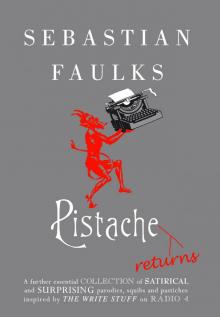 Pistache Returns
Pistache Returns The Girl at the Lion D'Or
The Girl at the Lion D'Or Pistache
Pistache Jeeves and the Wedding Bells
Jeeves and the Wedding Bells A Week in December
A Week in December The Vintage Book of War Stories
The Vintage Book of War Stories Engleby
Engleby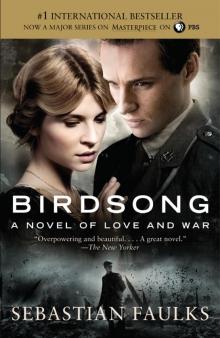 Birdsong
Birdsong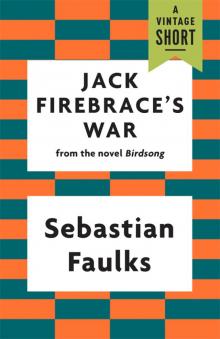 Jack Firebrace's War
Jack Firebrace's War Where My Heart Used to Beat
Where My Heart Used to Beat A Possible Life
A Possible Life The Fatal Englishman: Three Short Lives
The Fatal Englishman: Three Short Lives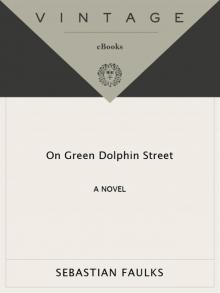 On Green Dolphin Street
On Green Dolphin Street Charlotte Gray
Charlotte Gray A Broken World: Letters, Diaries and Memories of the Great War
A Broken World: Letters, Diaries and Memories of the Great War Human Traces
Human Traces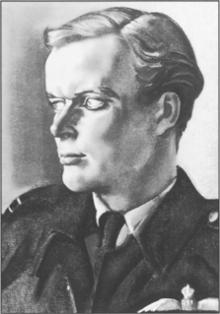 The Fatal Englishman
The Fatal Englishman A Broken World
A Broken World Paris Echo
Paris Echo War Stories
War Stories Girl At the Lion d'Or
Girl At the Lion d'Or